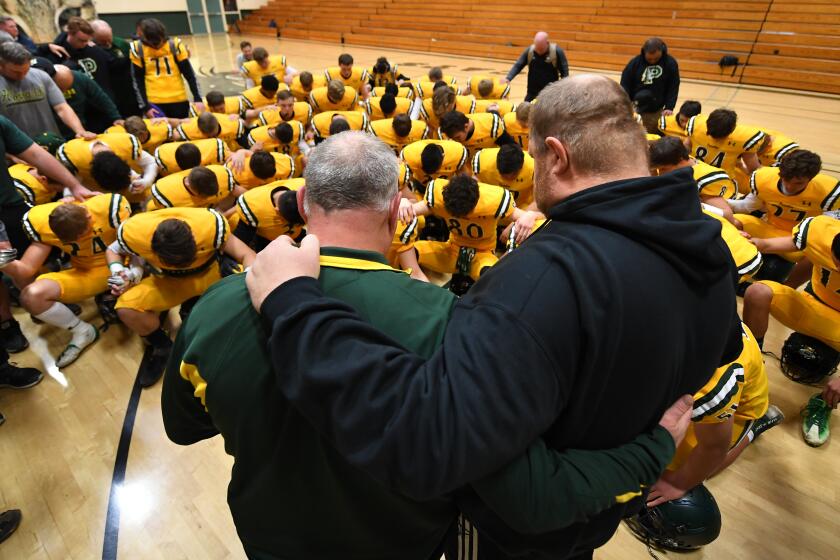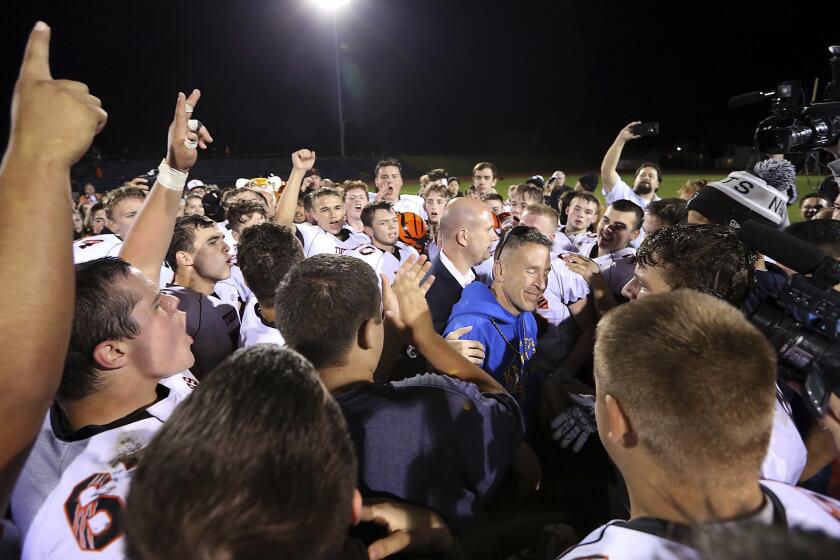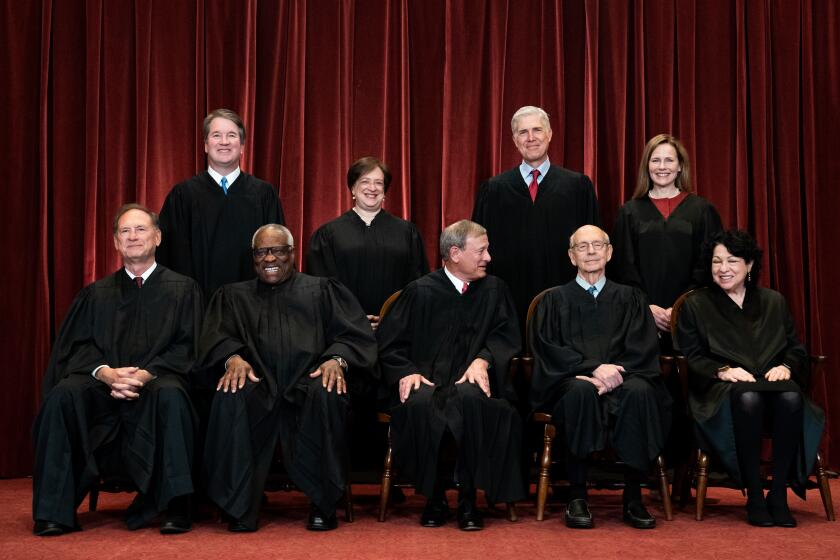High school teams praying isn’t new, but coaches concerned by Supreme Court ruling
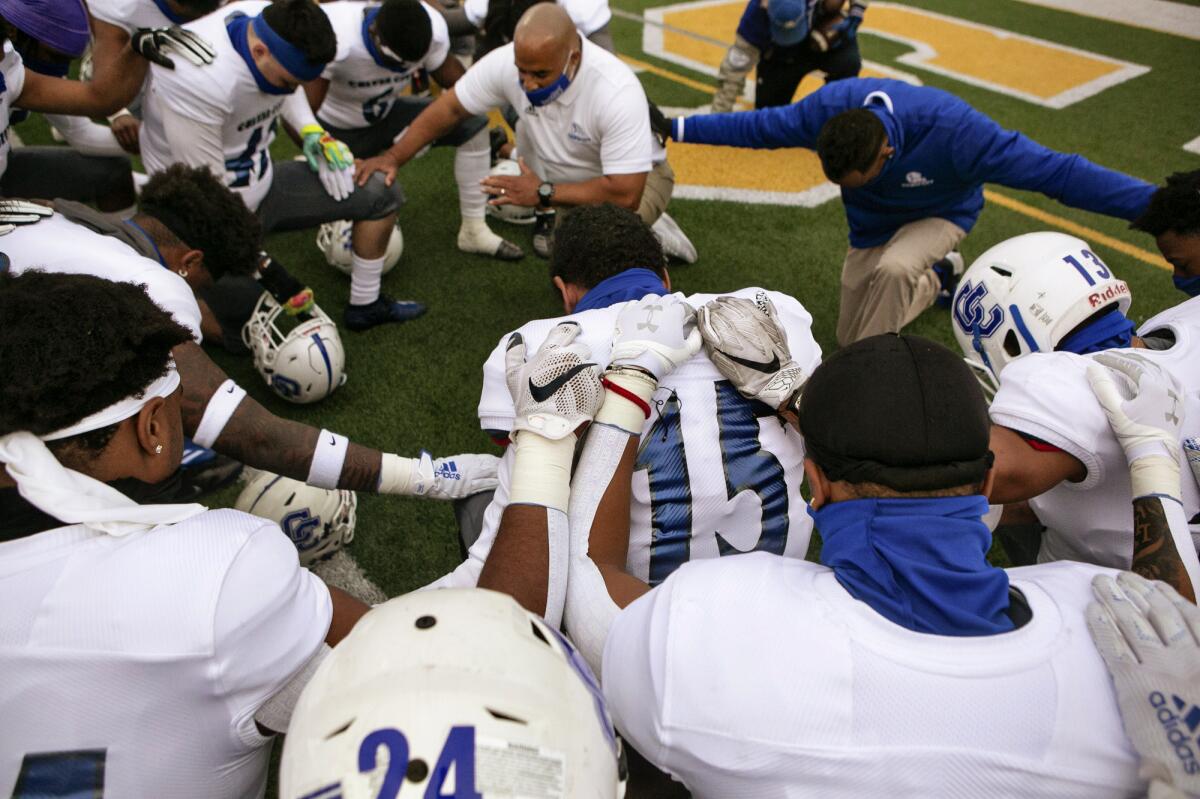
- Share via
Stafon Johnson has long been a self-described “church boy.”
The Dorsey High coach and former standout Dons running back found a home base in church, growing up in Compton. His grandfather was on the minister’s board there. Faith came along when he started playing Pop Warner, when he came to Dorsey and when he realized pregame jitters could sometimes be calmed by a few words to God.
He said he never prayed before basketball games like he did football. It was the physicality of the game. The knowledge that freak accidents could happen with one misplaced cleat.
“When I got to the NFL and college, there’s an actual chaplain,” Johnson said. “So I just thought that was just one of those universal things, where, ‘Duh.’”
But prayer within public high school football programs is not so simple.
People are reacting to a U.S. Supreme Court decision that said it was OK for a high school football coach in Washington state to kneel and pray after games. The justices voted 6 to 3 that such prayer does not amount to an official “establishment’”of religion.
On Monday, the Supreme Court ruled in favor of a football coach in Washington state that was placed on paid leave after praying on the field’s 50-yard line after games.
The decision blurs the line between church and state in public schools, with the high court holding that the coach’s actions were protected by the 1st Amendment. For some coaches like Johnson captaining LAUSD programs, that line has long been hazy.
Johnson’s reaction to the ruling was one of surprise. Not at the verdict — at the case in general because he says a few words of prayer with his Dorsey group before every game.
“Every step of my way, going through this game, we’ve prayed,” said Johnson, a former Dorsey and USC standout running back. “I’m a spiritual guy, I’m definitely a religious guy. So I don’t want to push anything on [the team] — just more so just pray for the team and for their safety and things of that nature. I think that’s pretty much universal.”
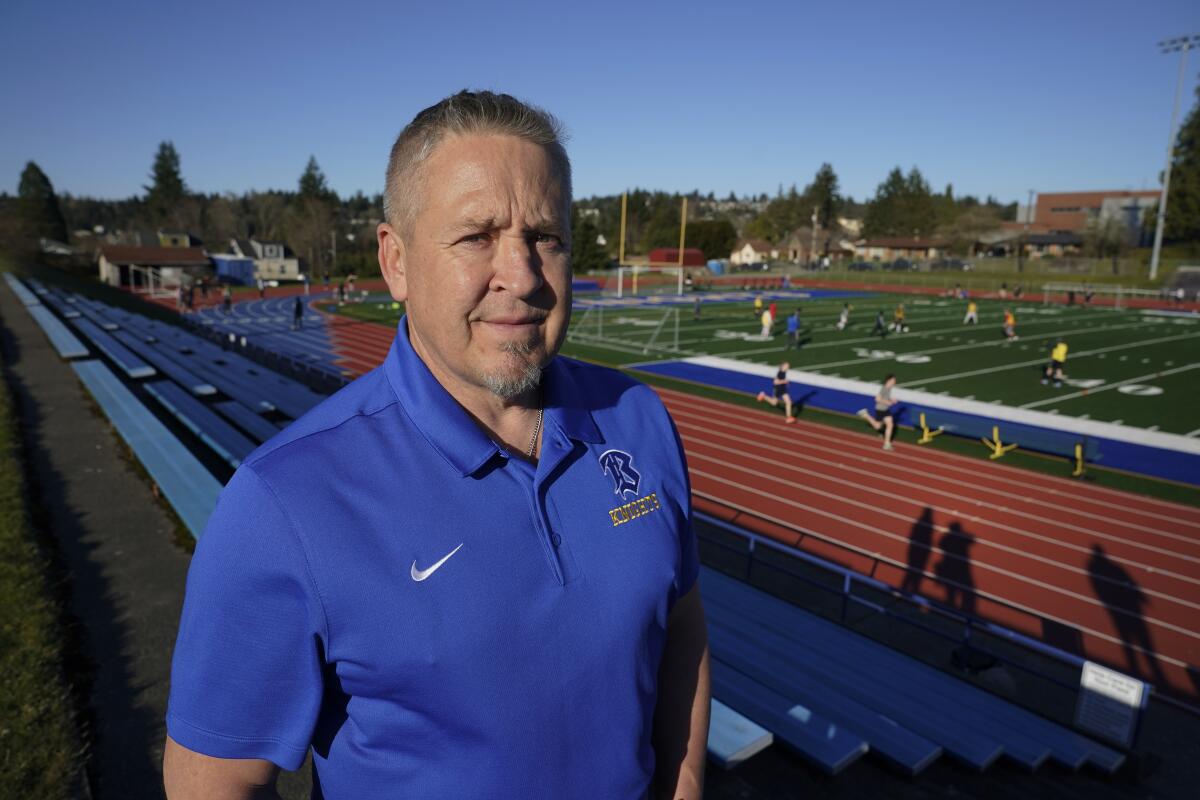
“From the story [of the case], it sounded like the players felt pressured to participate, and I wouldn’t want any player on my team to feel any pressure to participate before or after a game.
— David Wiltz, Dymally football coach
After warmups, directly before the kickoff, the Dons gather as Johnson prays for their comfort. For their safety. For the other team’s health. Prays, he says, because faith and togetherness are rooted in a physical sport based around feeling like “somewhat of a warrior.”
“You look at old war movies, and they used to pray before they go to war,” Johnson said. “It’s more of a combat-type sport.”
Los Angeles schools Supt. Alberto M. Carvalho told The Times the district’s policy already made clear that employees are allowed to pray, but on their own time and in their own place. The district forbids prayers that would make students feel compelled to join, Carvalho said.
Eight to 10 years ago, Lorenzo Hernandez and Garfield High held pregame moments of prayer similar to Johnson. But over time, as they became more “conscientious” of the imposition of religion, he said, those moments melted away into the team’s nonreligious pep talks.
Public school coaches, Hernandez said, had to be more careful, free of the specific religious affiliation of so many private or charter institutions.
The conservative majority said football coach Joe Kennedy’s prayers on the field were protected as free speech, and not an official promotion of religion.
A majority of his players, however, have continued to pray on their own before games, Hernandez said. And he felt the group would likely welcome moments of demonstration that could now have looser sanctions under the Supreme Court ruling.
“They follow the NFL, they follow college football and they see certain things,” Hernandez said, alluding to professional players frequently praying publicly after games. “They always either want to mimic it or feel they themselves need to have prayer before the game.”
Venice High’s Angelo Gasca was adamant coaches of public schools can’t enforce religious beliefs and that the Supreme Court ruling wouldn’t change that view, but he also wouldn’t and hasn’t stopped his players from organizing their own pregame moments of prayer.
Dymally’s David Wiltz was firm it wouldn’t be right to lead his athletes in demonstration, but if 80% to 90% of his team came to him and asked for teamwide prayer, he said he’d likely explore that under the high court’s latest decision.
Issues only arise, said Taft assistant principal Neezer McNab, when there is any kind of pressure on the team to conform. It’s the reason some coaches would still be hesitant or unwilling to involve the team in any sort of religious activity.
For more than 50 years, the court has ruled that prayer in public schools violates the 1st Amendment’s prohibition against the establishment of religion.
“From the story [of the case], it sounded like the players felt pressured to participate, and I wouldn’t want any player on my team to feel any pressure to participate before or after a game,” Wiltz said.
When Johnson leads Dorsey in prayer, he tries to invoke God in a universal sense, he said — one that doesn’t push a particular faith but relates to a higher power.
A majority of his players participate, even if they aren’t of Christian faith.
To some, it’s simply an act rooted in football. As Wiltz put it:
“I don’t think a student or a player is considering the separation of church and state when they decide to pray.”
More to Read
Get our high school sports newsletter
Prep Rally is devoted to the SoCal high school sports experience, bringing you scores, stories and a behind-the-scenes look at what makes prep sports so popular.
You may occasionally receive promotional content from the Los Angeles Times.
